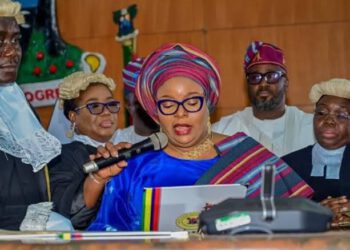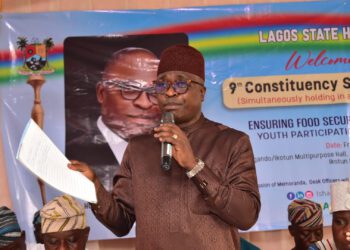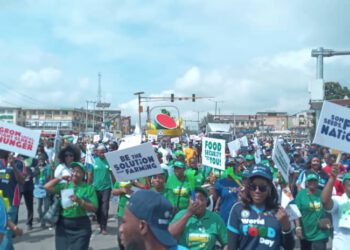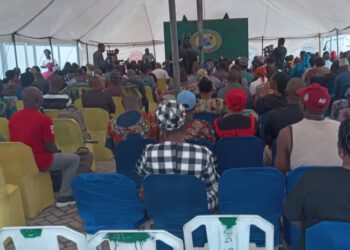By Dave Agboola
Lagos State is the most populous and economically dynamic city in Nigeria, with a population of over 20 million people and a GDP of over $100 billion. The city faces many challenges and opportunities as a result of its rapid urbanization and development, such as environmental degradation, traffic congestion, housing shortage, security threats, social inequality, cultural diversity, and tourism potential.
To address these issues and harness their opportunities, the state government has enacted many laws and policies over the years, covering various sectors and aspects of the city’s governance and management.
There is the common saying that: for a city without laws, there is no sin. But for Lagos State, its legislative arm of government lives up to their duties by churning out laws every now and then to address varied issues in the state. In other words, there are laws, so there are sins. However, there is a wide gap between the legislation and execution of these laws and policies in Lagos State, which undermines their effectiveness and impact on the city and its residents.
One major cause of the gap between legislation and execution in Lagos State is the lack of compliance and enforcement by both the government agencies and the citizens. According to a report by SERAP (2018), many of the laws and policies enacted by the state government are either ignored or violated by the relevant stakeholders, such as civil servants, private sector actors, civil society groups, or ordinary citizens. The report cited examples of laws and policies that are not complied with or enforced in the state, such as the Lagos State Property Protection Law of 2016; the Lagos State Environmental Management and Protection Law of 2017; and the Lagos State Tourism Law of 2015. The report attributed the lack of compliance and enforcement to factors such as corruption, impunity, ignorance, poverty, or cultural practices.
Of course, one of the laws that has generated much controversy and debate is the Lagos State Property Protection Law of 2016, which aims to protect the rights of property owners and buyers from the activities of land grabbers, popularly known as Omo-Oniles, who often extort money from them or encroach on their land. The law prohibits the use of force or self-help to take over any landed property, or the sale or purchase of any property without proper documentation. It also prescribes penalties for offenders, ranging from fines to imprisonment.
Conversely, the implementation of this law has been hampered by several factors, such as the lack of a registry of accredited Omo-Oniles in Lagos, which makes it difficult for buyers to verify the authenticity and authority of the sellers. Moreover, some Omo-Oniles have resorted to using thugs and cultists to intimidate and harass property owners and buyers, or to forge documents and impersonate family heads.
Furthermore, some property owners and buyers have also failed to comply with the law by not obtaining the necessary permits and approvals from the relevant authorities before developing or acquiring land.
Another law that has been enacted to address a critical challenge in Lagos is the Lagos State Environmental Management and Protection Law of 2017, which seeks to promote a cleaner, healthier and sustainable environment for the residents of the state. The law establishes the Lagos State Environmental Protection Agency (LASEPA) as the regulatory body for environmental matters, and empowers it to enforce compliance with environmental standards, regulations and guidelines. The law also creates various offences and penalties for environmental violations, such as littering, dumping of waste, noise pollution, open defecation, burning of tyres and plastics, street begging among others.
However, the implementation of this law has also faced some difficulties, such as the inadequate capacity and resources of LASEPA to monitor and enforce compliance with the law across the state.
Moreover, some residents have also shown resistance and indifference to the law, either due to ignorance, poverty or cultural practices. For instance, some residents still dispose their waste indiscriminately on roadsides, drainages and waterways, or burn their refuse in open spaces.
As per street begging, the level of non-compliance to this in so many areas within the metropolis is so appalling. For residents of Lekki Ajah area for instance, street begging on the Lekki -Epe Expressway corridor is becoming a huge concern. Some of the beggars are so desperate to get a tip from their target that they bang on your car doors in traffic indiscriminately. Another concern about this is that with time, if this issue is not addressed, there is every tendency that it might evolve into traffic robbery.
Furthermore, some industries and businesses have also flouted the law by emitting harmful substances into the air or water without proper treatment or control.
In like manner, when the Lagos State Tourism Law of 2015 was enacted, people thought sooner Lagos would become a tourism haven. The law, which aims to develop and promote tourism as a major source of revenue, is also targeted at creating employment for the state. The law establishes the Lagos State Tourism Promotion Agency (LSTPA) as the body responsible for planning, implementing and coordinating tourism policies and programmes in the state. It also provides for the registration and regulation of tourism establishments and practitioners, such as hotels, restaurants, travel agencies, tour operators, among others. The law stipulates standards and guidelines for tourism operations and services in the state.
You will agree with me that the implementation of tourism law has also encountered some challenges, such as the lack of adequate infrastructure and security for tourism activities in the state. Moreover, some tourism establishments and practitioners have also failed to comply with the law by not registering or renewing their licenses with LSTPA, or by providing substandard or fraudulent services to tourists.
Likewise, some residents have also shown hostility or apathy towards tourists or tourism activities in their communities, either due to cultural or religious reasons or due to perceived negative impacts on their environment or livelihoods.
The gap between legislation and execution in Lagos State has several negative consequences for the city and its residents. One of these consequences is the loss of public trust and confidence in the state government’s ability and willingness to deliver good governance and public services.
According to a survey by NOIPolls (2019), Lagos State ranked low among other states in Nigeria in terms of citizens’ satisfaction with governance performance indicators, such as security, education, health care, electricity supply, road infrastructure, water supply, waste management, and job creation. The survey also revealed that many citizens in Lagos State are dissatisfied with the state government’s responsiveness to their needs and demands, as well as its transparency and accountability.
Another consequence of the gap between legislation and execution in Lagos State is the waste of public resources and opportunities for development. According to a report by BudgIT (2020), Lagos State has one of the highest budgets among other states in Nigeria, with an estimated expenditure of N1.17 trillion ($3.06 billion) for 2020.
However, the report also noted that many of the budgeted projects and programmes are either poorly executed or not executed at all, due to factors such as mismanagement, diversion, inflation, or abandonment. The report also highlighted some of the missed opportunities for development in Lagos State due to poor budget performance, such as improving health care facilities amid COVID-19 pandemic; providing affordable housing for low-income earners; enhancing transport infrastructure to ease traffic congestion; promoting renewable energy sources to reduce carbon emissions; and attracting more tourists to boost revenue generation.
To bridge the gap between legislation and execution in Lagos State, there is a need for more concerted efforts by all stakeholders involved in the governance process. Some of these efforts include:
• Improving communication and collaboration between the executive and legislative arms of government on policy formulation and implementation;
• Strengthening capacity building and monitoring mechanisms for government agencies responsible for executing laws and policies;
• Enhancing public awareness and education on laws and policies affecting citizens’ rights and responsibilities;
• Increasing public participation and feedback on laws and policies through various platforms such as town hall meetings, social media, or petitions;
• Reducing corruption and impunity among public officials through effective anti-corruption agencies and judicial systems.
Overall, it is evident enough that Lagos State has enacted many laws to address its various challenges and opportunities as a megacity. However, it is also clear that these laws have faced many issues and obstacles in their implementation that have reduced their effectiveness and impact.
Therefore, there is need for more concerted efforts by all stakeholders, including the government, civil society, private sector and citizens, to ensure that these laws are properly implemented and enforced in order to achieve their intended objectives and benefits for Lagos State.
Dave writes from Lagos State.





















